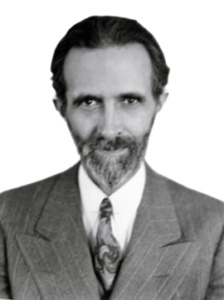Franklin Merrell-Wolff is one of those thinkers who just blows your mind wide open. This American philosopher and mystic from the early 20th century, feels like a hidden gem. He wasn’t some ancient guru from the East or a stuffy European academic; he was a guy from California who blended math, philosophy, and profound spiritual experiences into something totally unique. His book, The Philosophy of Consciousness Without an Object, written in the 1930s, is basically his manifesto on transcendental consciousness. It argues that true awareness isn’t tied to things or thoughts – it’s this pure, objectless state that’s the foundation of everything. He makes mysticism feel accessible, like something I could chase through deep thinking rather than just sitting in lotus position for hours.
 Born in 1887 in Pasadena, California, Franklin grew up in a strict Methodist family. His dad was a minister and a citrus farmer, which must have been this weird mix of religion and practicality. He was homeschooled by his mom until nine, and even as a teen, he started rebelling against rigid ethics, turning instead to a quest for ultimate truth. By college, he was killing it at Stanford, majoring in math with minors in philosophy and psychology, and he even got into Phi Beta Kappa. Then he headed to Harvard for grad work in philosophy. But academia wasn’t enough; in 1914, he ditched teaching math at Stanford to pursue spiritual enlightenment full-time. He dabbled in Theosophy, Sufism, and Eastern traditions, founding philosophical communities and even building an ashram near Mount Whitney with his first wife, Sarah (whom he called Sherifa). They got married in 1920, and together they explored Vedanta and Buddhism. His big breakthrough came in 1936 with two massive mystical “recognitions” that changed everything. After Sherifa passed in 1959, he married Gertrude, and kept teaching and recording audio essays until his death in 1985 at 98.
Born in 1887 in Pasadena, California, Franklin grew up in a strict Methodist family. His dad was a minister and a citrus farmer, which must have been this weird mix of religion and practicality. He was homeschooled by his mom until nine, and even as a teen, he started rebelling against rigid ethics, turning instead to a quest for ultimate truth. By college, he was killing it at Stanford, majoring in math with minors in philosophy and psychology, and he even got into Phi Beta Kappa. Then he headed to Harvard for grad work in philosophy. But academia wasn’t enough; in 1914, he ditched teaching math at Stanford to pursue spiritual enlightenment full-time. He dabbled in Theosophy, Sufism, and Eastern traditions, founding philosophical communities and even building an ashram near Mount Whitney with his first wife, Sarah (whom he called Sherifa). They got married in 1920, and together they explored Vedanta and Buddhism. His big breakthrough came in 1936 with two massive mystical “recognitions” that changed everything. After Sherifa passed in 1959, he married Gertrude, and kept teaching and recording audio essays until his death in 1985 at 98.
The Philosophy of Consciousness Without an Object is structured around his personal awakenings, with parts on the ground of knowledge, a bunch of aphorisms, and commentaries that critique Western philosophy while weaving in Eastern wisdom. The core idea is that consciousness doesn’t need objects to exist. In our everyday lives, we’re always aware of something – a phone, a thought, a feeling – but Merrell-Wolff says there’s a deeper level, “Consciousness-without-an-object,” which is timeless, beyond duality, and the true reality. He describes it as a state where self and universe blend into one indissoluble whole, like Nirvana or Samadhi in Buddhism. Drawing from Shankara’s Advaita Vedanta, he argues it’s not just emptiness; it’s fullness, light, and infinite value. One of his aphorisms nails it: “Consciousness-without-an-object is.” Simple, right? But it means awareness is primary, not some byproduct of brain chemicals or matter, which totally flips materialism on its head.
What’s cool is how he grounds it in his own experiences. In August 1936, while meditating on Shankara’s texts, he had this explosive realization: a shift to a void that was also pure light and sound, leaving him with unbreakable satisfaction. A month later, another hit; what he termed “High Indifference,” where language failed, and he felt one with conscious space. These weren’t drug trips or hallucinations; they were intellectual breakthroughs via Jnana Yoga, the path of knowledge. He even contrasts them with a bad codeine experience to show the difference – mysticism brings clarity and noetic value, new knowledge that science can’t touch. Bridging East and West, he pulls from Hegel and Schopenhauer alongside Buddha and Plato, saying true freedom comes from detaching from objects.
Merrell-Wolff’s philosophy feels like a roadmap to inner peace. It’s empowering to think consciousness is the boss, not the stuff around us. Sure, critics might say it veers into solipsism, where only your mind exists, but he counters by emphasizing unity with the universe. In a world obsessed with AI and virtual realities, his ideas question what’s real – maybe consciousness is the ultimate VR, projecting everything.
In the end, Franklin Merrell-Wolff’s legacy is this radical invitation to transcend. His book isn’t just theory; it’s a call to action through rigorous self-inquiry. It’s exciting to discover someone who proves you don’t need to be ancient or enlightened from birth to grasp the infinite. It makes me hopeful that amid all the chaos, there’s a timeless consciousness waiting for us all to wake up to it.


